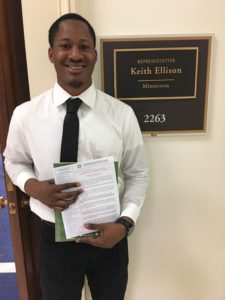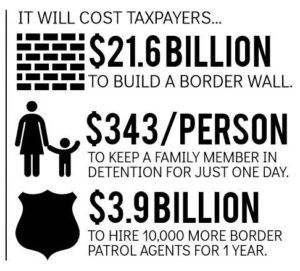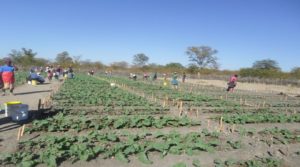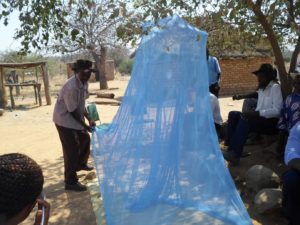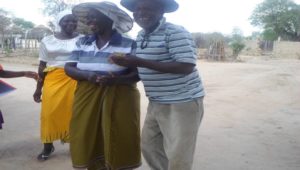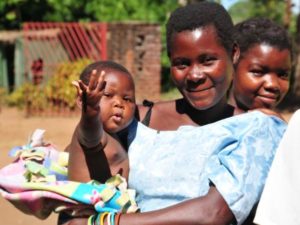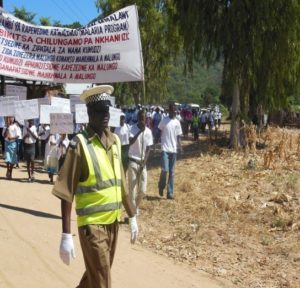Lutherans are taking action across the country! Below you will find our monthly State Advocacy Newsletter. Share with your friends!
ELCA Advocacy Office, Washington, D.C.
The Rev. Amy Reumann, director
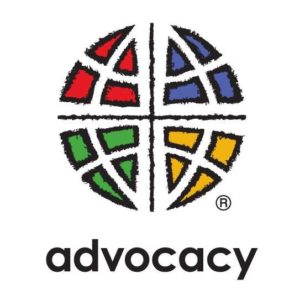 HEALTH CARE: The House of Representatives passed HR 1628, The American Health Care Act (AHCA) by a party line vote of 217-213 on May 4. The bill would dismantle needed support for people with disabilities, the elderly and those facing poverty. With its passage, our work now shifts to the Senate where opportunities to shape the effort have more promise for results. Please continue to stand with us as we make clear to our elected officials that Lutherans support affordable quality health care for all. Read ELCA Advocacy’s full statement here.
HEALTH CARE: The House of Representatives passed HR 1628, The American Health Care Act (AHCA) by a party line vote of 217-213 on May 4. The bill would dismantle needed support for people with disabilities, the elderly and those facing poverty. With its passage, our work now shifts to the Senate where opportunities to shape the effort have more promise for results. Please continue to stand with us as we make clear to our elected officials that Lutherans support affordable quality health care for all. Read ELCA Advocacy’s full statement here.
ECUMENICAL ADVOCACY DAYS: Ecumenical Advocacy Days, a movement of the ecumenical Christian community, gathered faith leaders in Washington, D.C., last month calling on Congress to “to make budget decisions that advance the common good.” Congregating on Capitol Hill, hundreds of clergy and lay faith leaders from across the U.S. voiced their concern about cuts to programs that address human needs. Seven of the faith leaders were arrested while engaging in group public prayer at the one of the Senate office buildings.
ELCA Advocacy connected with Lutheran participants throughout the event, hosting workshops on issues such as “Christian leadership for climate action,” and advocacy on the root causes of migration, and models for church engagement in advocacy. Collectively, advocacy staff also discussed our denomination’s unique call to public church and witness and to the special importance of Lutheran voices in public dialogue.
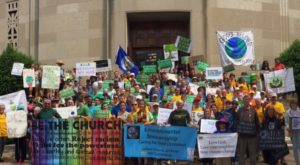 CLIMATE CHANGE: ELCA Advocacy co-hosted a joint Sending Prayer Service at the Lutheran Church of Reformation shortly before the 2017 Climate March in Washington, D.C., on April 29, together with the United Church of Christ, Disciples of Christ and Creation Justice Ministries. The D.C. Climate March brought together crowds in the tens of thousands who protested much of the current administration’s actions to roll back strategies against climate change and called for sustainable policies that support ecological justice.
CLIMATE CHANGE: ELCA Advocacy co-hosted a joint Sending Prayer Service at the Lutheran Church of Reformation shortly before the 2017 Climate March in Washington, D.C., on April 29, together with the United Church of Christ, Disciples of Christ and Creation Justice Ministries. The D.C. Climate March brought together crowds in the tens of thousands who protested much of the current administration’s actions to roll back strategies against climate change and called for sustainable policies that support ecological justice.
Ahead of the international Science March hosted earlier that week, ELCA Advocacy issued a blog titled “Stewarding God’s Creation: Science Matters.” A key message of the blog is that it “is through our God-given wisdom that we utilize science to be God’s stewards while we are here on earth.” ELCA Advocacy also worked with Living Lutheran magazine to develop a four-part series of articles on the effect of climate change on creation in conjunction with the observance of Earth Day.
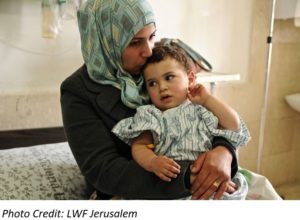 AUGUSTA VICTORIA HOSPITAL: The Peace Not Walls program sent an action alert on May 1 in support of East Jerusalem hospitals and for health care needs in the region. Augusta Victoria Hospital, operated by The Lutheran World Federation (LWF) in the Holy Land, is the largest recipient of U.S. health assistance among the East Jerusalem hospitals. The hospitals face continued cash-flow problems in caring for the people in the region. The LWF, member churches, and ELCA Peace Not Walls have advocated for the hospitals’ debt crisis for several years.
AUGUSTA VICTORIA HOSPITAL: The Peace Not Walls program sent an action alert on May 1 in support of East Jerusalem hospitals and for health care needs in the region. Augusta Victoria Hospital, operated by The Lutheran World Federation (LWF) in the Holy Land, is the largest recipient of U.S. health assistance among the East Jerusalem hospitals. The hospitals face continued cash-flow problems in caring for the people in the region. The LWF, member churches, and ELCA Peace Not Walls have advocated for the hospitals’ debt crisis for several years.
The action alert for Augusta Victoria Hospital was launched shortly before President Trump was scheduled to meet Palestinian National Authority President Mahmoud Abbas on May 3. In addition to continued international support, the action alert also encouraged lawmakers to visit hospitals in the region.
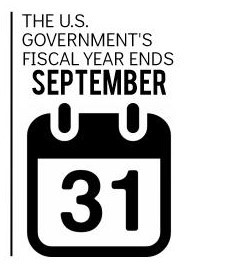 FEDERAL BUDGET AND MIGRATION: Congressional leaders at the start of this month came to a compromise on the U.S. budget and sent the spending bill to the president’s desk on May 4. Some controversial subjects, such as a bail-out for coal miner benefits, were included in the final version of the bill. Others, such as funding for a border wall requested by President Trump, were excluded.
FEDERAL BUDGET AND MIGRATION: Congressional leaders at the start of this month came to a compromise on the U.S. budget and sent the spending bill to the president’s desk on May 4. Some controversial subjects, such as a bail-out for coal miner benefits, were included in the final version of the bill. Others, such as funding for a border wall requested by President Trump, were excluded.
Shortly before Congress announced the specifics of their budget proposal, ELCA Advocacy shared a blog on the costs (both fiscally and morally) of increased military spending, migrant detentions and border enforcement. While the deal that came from the negotiations does not include funding for a new border wall, it provides an additional $1.5 billion for immigration enforcement that will continue to separate families.
SOUTH SUDAN UPDATE: At the end of April, the House of Representatives passed a resolution (H. Res. 187) to increase emergency funding to respond to the famine in South Sudan. In addition, the resolution calls upon the government of South Sudan to stop hostilities so that humanitarian aid can go where it’s needed and allow immediate and unrestricted access to the southern part of Unity state, where there is a famine. ELCA Advocacy sent an action alert in support of the South Sudanese in March. Faith advocates can continue to urge Congress to pass this resolution at the ELCA Action Center.
Lutheran Office for World Community, United Nations, New York, N.Y.
Dennis Frado, director
PEACE NOT WALLS CONVENING: Peace Not Walls held its annual gathering in College Park, Md., April 25 and 26. Peace Not Walls, an advocacy campaign of the ELCA, urges peace in the Holy Land through accompaniment, advocacy and awareness-raising. The gathering was attended by members of 15 ELCA synods. Attendees ranged from seminarians, young adults who have served in the Holy Land, companion synods to the Evangelical Lutheran Church in Jordan and the Holy Land (ELCJHL), and many more.
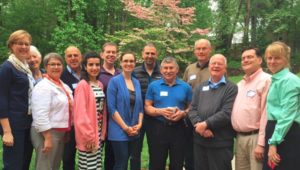
The gathering focused on deepening advocacy understanding and strengthening advocacy skills. The participants spent time planning for the coming year to raise awareness within their synods to increase accompaniment and advocacy efforts. The participants received updates from the region, including reflections from two Palestinian Lutheran members of the ELCJHL (Bassem Thabet and Majd Khoury); an update on the work of the ELCA in the Holy Land, the ELCJHL, and The Lutheran World Federation from Cindy Halmarson; and a situation update on the status of Jerusalem from human rights lawyer Daniel Seidemann (via Skype).
If you are interested in having someone speak with your congregation about peace and justice in Israel and Palestine please, contact peacenotwalls@elca.org.
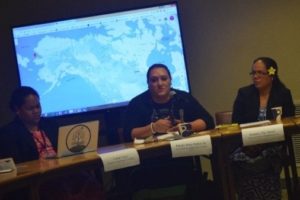 UNITED NATIONS INDIGENOUS ISSUES: The Permanent Forum on Indigenous Issues took place in the UN Headquarters from April 24th to May 5th. This year, the special theme was on the “Tenth Anniversary of the United Nations Declaration on the Rights of Indigenous Peoples: Measures taken to implement the Declaration”. On Monday, May 2nd, Prairie Rose Seminole, ELCA Program Director of American Indian Alaska Native Ministries spoke at a Forum’s side event panel titled: “Climate Induced Displacement: Realities, Rights, and Responses”. Prairie Rose Seminole discussed the challenges faced by Native Alaskan communities whose land is being threatened by climate change. She outlined the lack of accessibility to public infrastructure that native communities face, and denounced the lack of resources for planned relocation from communities threatened by climate change. She discussed Native cultural identity tied to ancestral land, and the challenges to this identity posed by relocation due to climate change. She concluded by affirming Indigenous people’s role in the fight against climate change, as they are in the front-lines of climate induced displacement.
UNITED NATIONS INDIGENOUS ISSUES: The Permanent Forum on Indigenous Issues took place in the UN Headquarters from April 24th to May 5th. This year, the special theme was on the “Tenth Anniversary of the United Nations Declaration on the Rights of Indigenous Peoples: Measures taken to implement the Declaration”. On Monday, May 2nd, Prairie Rose Seminole, ELCA Program Director of American Indian Alaska Native Ministries spoke at a Forum’s side event panel titled: “Climate Induced Displacement: Realities, Rights, and Responses”. Prairie Rose Seminole discussed the challenges faced by Native Alaskan communities whose land is being threatened by climate change. She outlined the lack of accessibility to public infrastructure that native communities face, and denounced the lack of resources for planned relocation from communities threatened by climate change. She discussed Native cultural identity tied to ancestral land, and the challenges to this identity posed by relocation due to climate change. She concluded by affirming Indigenous people’s role in the fight against climate change, as they are in the front-lines of climate induced displacement.
California
Mark Carlson, Lutheran Office of Public Policy
loppca.org
 CARE FOR CREATION: The Lutheran Office of Public Policy – California is supporting legislation to address the need for safe, affordable water for drinking and hygiene. Affordability is a growing challenge. LOPP-CA was once again invited by the state Water Resources Control Board to have a display table at the CalEPA Earth Day Festival/Bring Your Kids to Work Day. Kids were invited to write notes to the kids in Shishmaref, Alaska, (March 31, Living Lutheran), whose homes are threatened by the rising sea level. A number of Lutherans participated in the March for Science and the People’s Climate March. LOPP-CA is hosting a breakfast at the Sierra Pacific Synod Assembly in Fresno, Voices and Visions in the Valley, with an attorney from the Leadership Counsel for Justice and Accountability, which is a lead organization in bringing $70 million of g
CARE FOR CREATION: The Lutheran Office of Public Policy – California is supporting legislation to address the need for safe, affordable water for drinking and hygiene. Affordability is a growing challenge. LOPP-CA was once again invited by the state Water Resources Control Board to have a display table at the CalEPA Earth Day Festival/Bring Your Kids to Work Day. Kids were invited to write notes to the kids in Shishmaref, Alaska, (March 31, Living Lutheran), whose homes are threatened by the rising sea level. A number of Lutherans participated in the March for Science and the People’s Climate March. LOPP-CA is hosting a breakfast at the Sierra Pacific Synod Assembly in Fresno, Voices and Visions in the Valley, with an attorney from the Leadership Counsel for Justice and Accountability, which is a lead organization in bringing $70 million of g reenhouse gas reduction funds to the Fresno area through the Transformative Climate Communities Program. The program was created by legislation supported by LOPP-CA. Besides reducing carbon emissions, it seeks to reduce poverty and promote equity and public health.
reenhouse gas reduction funds to the Fresno area through the Transformative Climate Communities Program. The program was created by legislation supported by LOPP-CA. Besides reducing carbon emissions, it seeks to reduce poverty and promote equity and public health.
UPCOMING: Immigration (May 15), LGBTQ (May 16), Early Childhood (May 24), and Hunger Action (May 24) advocacy days at the Capitol, with Lutheran participation to help prevent hunger, support economic well-being and inclusion, and challenge discrimination.
Colorado
Peter Severson, Lutheran Advocacy Ministry–Colorado
Lam-co.org
LEGISLATIVE SESSION CONTINUES: The Colorado General Assembly continues to work on creating a budget that is acceptable to both chambers. Lutheran Advocacy Ministry-Colorado has been advocating against budget cuts to programs that aid the most vulnerable Coloradans. The current proposal still contains major cuts to the Hospital Provider Fee, which would significantly affect hospital services in rural areas.
We are supporting several bills that have been introduced late: House Bill 1310 would prevent residential landlords from charging application fees beyond their baseline costs for background checks; House Bill 1307 would create a family and medical leave insurance program to provide partial wage replacement for workers who need to take time off to care for themselves or a sick family member; Senate Bill 207 is a bipartisan bill to strengthen Colorado’s behavioral health-crisis system.
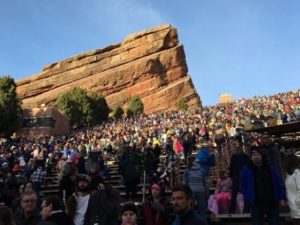 BISHOP AT RED ROCKS: We were delighted to watch Bishop Jim Gonia preach to nearly 11,000 worshipers at Red Rocks on Easter morning. Way to go!
BISHOP AT RED ROCKS: We were delighted to watch Bishop Jim Gonia preach to nearly 11,000 worshipers at Red Rocks on Easter morning. Way to go!
INTERIM COMMITTEE PROPOSALS: The Colorado General Assembly will adjourn on May 10. Before the 2018 legislative session, interim committees will meet to study important issues. LAM-CO supports proposals to create interim committees to study housing and homelessness as well as access to disability support programs.
SYNOD ASSEMBLY: The Rocky Mountain Synod Assembly will be in Colorado Springs May 4-7. LAM-CO will be present to talk with voting members about our important advocacy work.
New Jersey
The Rev. Sara Lilja, Lutheran Episcopal Advocacy Ministry of New Jersey (LEAMNJ)
CRIMINAL JUSTICE REFORM: Our parole system is broken in NJ. A2182/S895 will improve the parole system by rewarding good behavior and encouraging rehabilitation. It would allow low-risk individuals to be released from prison when they become parole eligible, as long as they have no serious disciplinary infractions and have participated in rehabilitation programs while incarcerated. LEAMNJ is urging congregation to call the Governor to ask him to sign this bill.
ECONOMIC JUSTICE: Heath Care Vigils- Last Friday NJ’s Congressmen Rep. Tom MacArthur (NJ-3) reported that he and his colleagues are ready to move forward with a vote on repeal next week with amendments to the plan. We fear that the “MacArthur” amendments will do little to fix the problems and still leave millions of persons without health care. 24,000,000 people in the US – including over a 500,000 here in New Jersey – would lose their health coverage if this repeal plan takes effect. LEAMNJ is co-sponsoring vigils around the state to let our law makers know that we understand health care is essential for everyone.
IMMIGRATION JUSTICE: LEAMNJ has been helping to educate congregations and clergy as to the rights of Immigrant persons and how they can stand in support of foreign born residents. We have developed a power point presentation and held several educational events in Clusters and Districts around the state addressing myths about refugees, asylum seekers, and immigrants.
persons and how they can stand in support of foreign born residents. We have developed a power point presentation and held several educational events in Clusters and Districts around the state addressing myths about refugees, asylum seekers, and immigrants.
The picture on the right is of the Synod Council packing “Stamp Out Despair” packets to give to undocumented persons being held in detention centers in NJ. Packets included: global stamps, phone cards, and stationary.
SHAPING PUBLIC OPINION: LEAMNJ distributes a Weekly Witness publication each Tuesday focusing on the upcoming lectionary text and public policy. If you would like to be on our mailing list sign up here.
New Mexico
Ruth Hoffman, Lutheran Advocacy Ministry – New Mexico
lutheranadvocacynm.org
The last couple of months have been very busy for Lutheran Advocacy-MN!
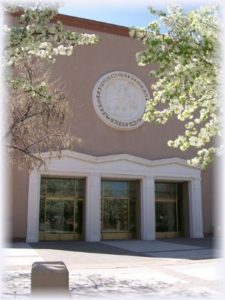 LEGISLATIVE SESSION WRAPS UP: The 2017 regular session of the Legislature has ended. LAM-NM worked on several bills that passed both chambers and made their way to the governor’s desk for consideration during the 20-day signing period. Those bills included:
LEGISLATIVE SESSION WRAPS UP: The 2017 regular session of the Legislature has ended. LAM-NM worked on several bills that passed both chambers and made their way to the governor’s desk for consideration during the 20-day signing period. Those bills included:
- prohibiting solitary confinement for juveniles, pregnant women, and people with severe mental illness or disabilities;
- raising the state minimum wage to $9.25; and
- “Ban the Box” – prohibiting private employers from asking about felony convictions on an initial employment application.
Unfortunately, the governor vetoed all of these bills on April 7. However, in a session that included much defensive work to avert cuts to programs that affect the lives of people living in poverty, many cuts were averted including the elimination of the state SNAP supplement on which more than 12,000 seniors rely.
A special session will be called in the next few weeks since the governor vetoed all of the funding for the legislative branch for of the state’s colleges and universities. The Legislature has challenged the governor’s vetoes as unconstitutional and has filed a motion in the state Supreme Court to overturn those vetoes. Stay tuned!
Ohio
Nick Bates, The Hunger Network
hungernetohio.com
THE OHIO BUDGET: The state House will approve its budget the first week of May and send it to the state Senate for one more month of public hearings and testimony. Faith Leaders are excited that the House added $170 million to address opiate addiction in Ohio and removed a $3 billion tax shift. However, we remain concerned about policies that will impose new bureaucratic hurdles – such as fees and work requirements – to those on Medicaid that will cause thousands of Ohioans to unjustly lose their coverage. This budget also continues to underinvest in Ohio’s response to hunger, despite ranking near the bottom of states for food security. You can read more details here on what is in and out of the budget.
Join our final Faith Community Advocacy Day on May 24 to speak up for health care, housing and hungry Ohioans.
MARIBEL TRUJILLO-DIAZ: We are sad to announce the deportation of Maribel Truijillo-Diaz shortly after Easter. Faith leaders in the Cincinnati and Columbus area responded with vigils and prayers to protect this active, 15-year community member and mother of four. She first was involved with immigration officials after a raid on her employer in 2007. However, she was considered a low-priority, checked in regularly with public officials, had a permit to legally work, and continued to be active in her parish. Immigration officers picked her up one evening with no notice to her or her attorney. In just days she was sent to a detention facility in Louisiana and eventually deported to Mexico. Maribel fears for her safety because she has had relatives kidnapped by the drug cartels in the region.
In Ohio, we are a people of hospitality as Scripture commands of us. It is time that our national officials realize that we welcome people like Maribel who want to offer a safe home for their children and strengthen our state. We will continue to stand with our brothers and sisters around the globe who seek safety and an opportunity for a better life. For when we reject the stranger, it is Christ we reject (Matthew 25).
Pennsylvania
Tracey DePasquale, Lutheran Advocacy–Pennsylvania
Lutheranadvocacypa.org
In May, LAMPa saw positive movement on some issues on which we have been working, including safe harbor for victims of child sex trafficking and the creation of a coalition to work on trauma-responsive schools.
On April 4, LAMPa participated in a planning meeting for the organization of a statewide coalition to facilitate the creation of trauma-responsive schools in Pennsylvania. We were invited because of LAMPa testimony given in 2015 before the Commission on Basic Education Funding, which included in its report a requirement for the Department of Education to develop protocols for creating a trauma-responsive system.
On April 25, SB554, creating a safe harbor for child victims of sex trafficking, unanimously passed the state Senate. LAMPa was a signatory to a letter delivered to House members two days later. Pennsylvania Lutherans have been working on this issue since last term, and more and more Women of the ELCA organizations are getting involved around the state.
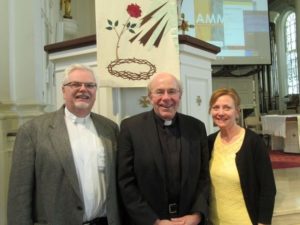 LAMPa and Pennsylvania hunger leaders also signed on to a letter delivered to lawmakers April 19 in support of funding to expand school breakfast through alternative models.
LAMPa and Pennsylvania hunger leaders also signed on to a letter delivered to lawmakers April 19 in support of funding to expand school breakfast through alternative models.
On April 24, LAMPa Director Tracey DePasquale participated in a capitol news conference outlining a clean-water agenda for Pennsylvania.
On April 26, DePasquale delivered a presentation at Lutheran Theological Seminary at Gettysburg for the school’s annual Spring Academy Week. She is shown above with Vicar Ron Costen, center, and the Rev. Holger Roggelin of Messiah Lutheran Church in Harrisburg. Costen begins a dual-site internship with Messiah and LAMPa on May 1.
Southeastern Synod
Hilton Austin
ALABAMA CRIMINAL JUSTICE REFORM: On April 11, her first day in office, Alabama Gov. Kay Ivey signed into law SB16, which says juries, not judges, have the final say on whether to impose the death penalty in capital murder cases. Alabama had been the only state that allowed a judge to override a jury’s recommendation when sentencing capital murder cases.
TENNESSEE READY BENCHES: On April 6, Tennessee ready benches co-sponsored an interfaith training opportunity to engage in discussions based on the teachings of our respective faith traditions and focus on the moral imperative to engage in social justice work and community involvement as central to our ministries, both in our places of worship as well as in the public square. Breakfast and lunch was provided by Southeastern Synod Tennesseans for Criminal Justice Reform, Southeastern Synod Ready Bench for Health Care Reform, and Faith That Heals (United Methodist Church). The coordinating hosts were the Rev. Ken Edwards, Belmont UMC; and Justin Jones, a senior at Fisk University in Nashville. The Rev. William Barber II of North Carolina conducted the training.
CONGREGATIONAL ADVOCACY TEAM: In order to continue to build capacity and support developing congregational advocacy teams, the Rev. Tiffany Chaney, Policy Council member, has developed a database that will enable state advocacy leaders to identify congregational advocates by state and congregation and communicate with them on state and national public policy via email and texts.
Washington
Paul Benz, Faith Acton Network
fanwa.org
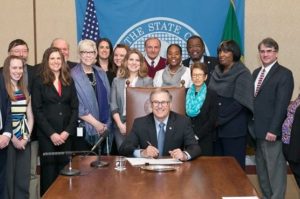 LEGISLATIVE REGULAR SESSION ENDS, SPECIAL SESSION BEGINS: The regular session of the Washington Legislature ended officially on April 23 without completing its main task to agree to a 2017-2019 biennial budget. Consequently, the governor called for a 30-day special session that began April 24 and will end May 23. A budget negotiating group from each party caucus of each chamber now meets to work out their differences. That may take a while. FAN is still urging our advocates to send messages to their legislators regarding the need for new revenue to fund our K-12 education system as well as health and human services programs.
LEGISLATIVE REGULAR SESSION ENDS, SPECIAL SESSION BEGINS: The regular session of the Washington Legislature ended officially on April 23 without completing its main task to agree to a 2017-2019 biennial budget. Consequently, the governor called for a 30-day special session that began April 24 and will end May 23. A budget negotiating group from each party caucus of each chamber now meets to work out their differences. That may take a while. FAN is still urging our advocates to send messages to their legislators regarding the need for new revenue to fund our K-12 education system as well as health and human services programs.
VICTORY BILLS! FAN’s advocates and Olympia lobby team supported and worked on the following bills that have passed and are in the process of being signed by the governor:
- HB 1079 creates a “no contact order” system to protect victims of human trafficking from their traffickers.
- HB 1501 requires notification of law enforcement and victims when an offender applies to purchase a gun.
- HB 1713 implements recommendations from the children’s mental health work group.
- SB 5030 extends the statute of limitations for the crime of human trafficking from three to 10 years.
- SB 5069 allows the state Board of Community and Technical Colleges to do workforce-type classes in our state prison system that could lead to an associate’s degree.
- SB 5272 vacates convictions arising from offenses committed as a result of being a victim of trafficking.
- SB 5347 allows TANF recipients to have a second year of vocational education.
REGIONAL SUMMITS: FAN’s second programmatic season is about to begin with regional gatherings in the four corners of the state. These gatherings bring FAN advocates and allies together to share highlights from the legislative session, hear about local social justice efforts in that region, hear about FAN’s five work groups (Economic Justice, Criminal Justice, Human Trafficking, Health Care and Environmental Justice), and discuss next steps about effective collaboration with FAN.
Wisconsin
Cindy Crane, Lutheran Office for Public Policy in Wisconsin
Loppw.org
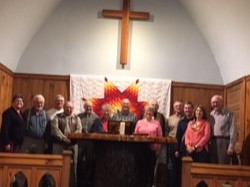 ADVOCACY TRAINING: The director met with the global mission committee in the East Central Synod to discuss how their team could approach organizing a synod event on advocacy. We met at Lutheran Church of the Wilderness, a predominantly Mohican congregation, and heard about the congregation’s rich history and work for justice.
ADVOCACY TRAINING: The director met with the global mission committee in the East Central Synod to discuss how their team could approach organizing a synod event on advocacy. We met at Lutheran Church of the Wilderness, a predominantly Mohican congregation, and heard about the congregation’s rich history and work for justice.
CARE FOR GOD’S CREATION: The LOPPW/South-Central Synod Care for God’s Creation team members the Rev. Nick Utphall and the Rev. Mae Jean Zelle led a workshop on climate change for a Women of the ELCA conference and meteorologist Bob Lindmeier gave a presentation on climate change at a community-wide event in Walworth held at an ELCA congregation.
LOPPW’s most pressing legislative efforts have been on a bill that would make it easier for utilities to assist homeowners to remove lead from their drinking water.
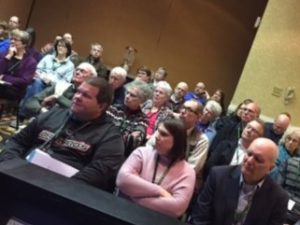 NEW RESOURCE: A devotional written by current and past LOPPW advisory council members with an introduction from the director and edited by Bishop Mary Froiland was completed just before the first 2017 synod assembly LOPPW attended: “Called into the World: Devotions on the ELCA Social Statements.”
NEW RESOURCE: A devotional written by current and past LOPPW advisory council members with an introduction from the director and edited by Bishop Mary Froiland was completed just before the first 2017 synod assembly LOPPW attended: “Called into the World: Devotions on the ELCA Social Statements.”
SYNOD ASSEMBLY: LOPPW Advisory Council Members the Rev. Sue Schneider and Lisa Hassenstab co-led with the director a workshop on Martin Luther and economic justice with an introduction to the new devotional.


















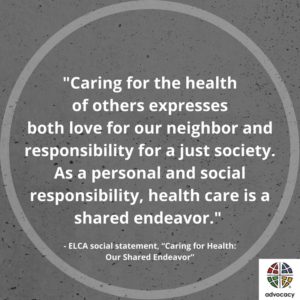
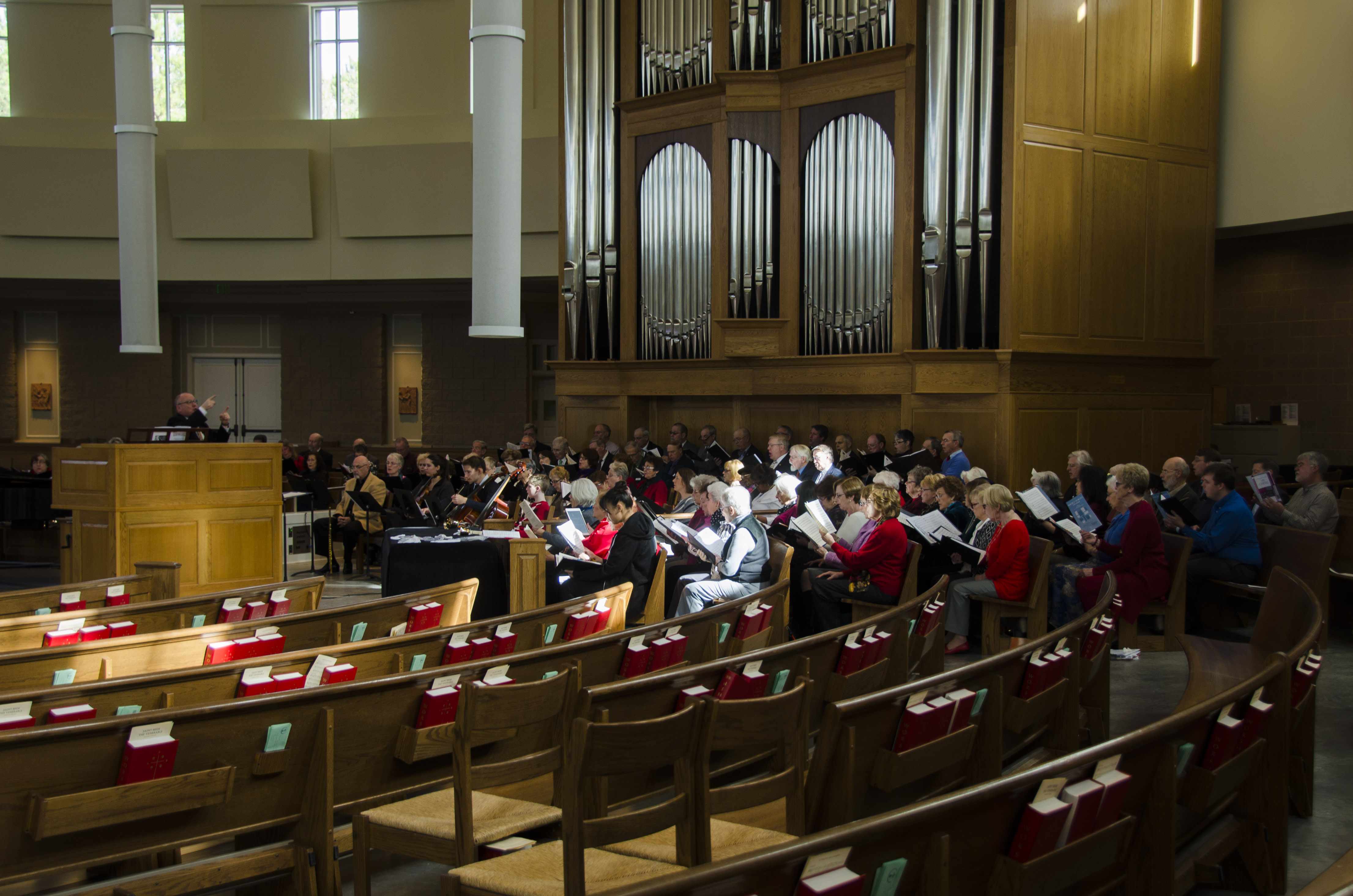 On Jan. 28-29, St. Stephen Lutheran Church, along with Saint Bede Catholic Church in Williamsburg, VA sponsored a Hymn Festival celebrating the Week of Christian Unity and the 500th anniversary of the Reformation. The two-day event featured David Cherwien, noted Lutheran organist and composer and Susan Palo Cherwien, hymn text writer and poet.
On Jan. 28-29, St. Stephen Lutheran Church, along with Saint Bede Catholic Church in Williamsburg, VA sponsored a Hymn Festival celebrating the Week of Christian Unity and the 500th anniversary of the Reformation. The two-day event featured David Cherwien, noted Lutheran organist and composer and Susan Palo Cherwien, hymn text writer and poet.
